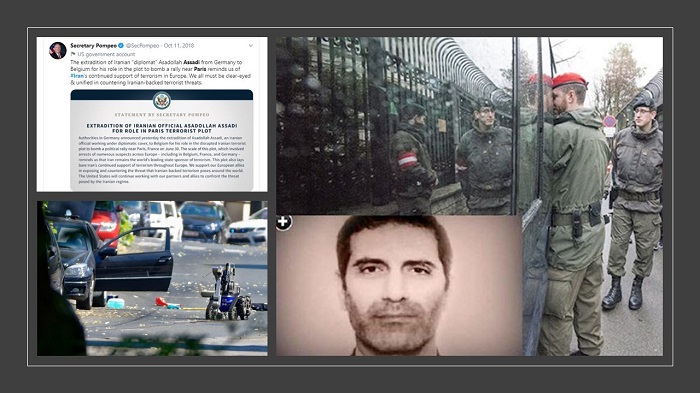

This is an abridged version of an article by former European parliament Vice President, Alejo Vidal Quadras.
The U.S. push to extend the sanctions against Iran has been sadly rejected by European governments at the U.N. There seems to be little reasoning behind the opposition to an arms embargo on the Iranian regime and this now leaves wide open the potential for Iran to buy weapons from Russia and China. The only possible reason is that European governments still wish to hang on to the 2015 nuclear deal with Iran, despite the fact that Iran has already broken the terms of that agreement.
The #Iranian diplomat who planned the bombing of the Iranian Resistance gathering on 30th June 2018 in the suburbs of #Paris, Assadollah Assadi, directly reported to Amiri Moghaddam. He personally handed over the bomb to the would-be bomber. #ProsecuteAssadi @antjeschippmann pic.twitter.com/2XnO9oXfas
— NCRI-FAC (@iran_policy) September 12, 2018
It is even harder to see why France, in particular, opposed the extension of the sanctions considering they were the target of Iranian inspired terrorism back in June 2018. This is when two Belgian Iranian terrorists tried to cross the French border from Belgium carrying enough explosives to kill hundreds of people attending the Free Iran rally by the Iranian opposition, The National Council of Resistance of Iran (NCRI), and The People’s Mojahedin Organization of Iran (PMOI /MEK Iran), at Villepinte, near Paris. It wouldn’t just have been Iranian members of the resistance movement killed and maimed as the rally was attended by many people from all around the world, including government dignitaries.
The extradition of Iranian “diplomat” Asadollah Assadi from Germany to Belgium for his role in the plot to bomb a rally near Paris reminds us of #Iran’s continued support of terrorism in Europe. We all must be clear-eyed & unified in countering Iranian-backed terrorist threats. pic.twitter.com/PSQRQdEYQa
— Secretary Pompeo (@SecPompeo) October 10, 2018
The June 2018 bomb plot was a new diversion from other terrorist activities in Europe. Before that incident, proxy groups like Hezbollah were involved in carrying out terrorist attacks. These proxy groups are financed and controlled from Iran, but Iran has always been able to hide behind the groups it was aiding and abetting. With the Villepinte attack, it would have been the first time that an Iranian diplomat, Assadollah Assadi, was directly involved. Assadi and his two accomplices are currently undergoing a trial in Belgium related to their bomb attempt.
It is odd that European governments should adopt such a conciliatory attitude towards the Iranian regime despite the fact that this terrorist attempt was planned and carried out by operatives of the Iranian Ministry of Intelligence and Security (MOIS). A Belgian police spokesperson said that most of the personnel working at the Iranian consulate in Belgium are in fact working for the Iranian intelligence service. This is not an isolated example of how Iran’s diplomatic services operate elsewhere in the world. Wherever they have strategic interests, the diplomatic corps is in actively working to further Iran’s ambitions as nuclear power and regional hegemonist.
We call for the expulsion of mercenaries of the mullahs’ Intelligence services and the terrorist Qods Force from the U.S. and Europe.#Iran#FreeIran pic.twitter.com/WPUHoQwlX4
— Maryam Rajavi (@Maryam_Rajavi) February 17, 2019
The recent uprisings in Iran have revealed increasing unrest and discontent within the Iranian population. Tehran is desperate to show its strength by behaving belligerently outside its borders, as well as displaying callousness and oppression within Iran itself towards its own people. European governments should be on guard against any further attacks carried out on behalf of the Iranian regime. This is a constant danger until Iranians achieve regime change within their own country or Europe displays a more assertive attitude towards the regime in Tehran.







